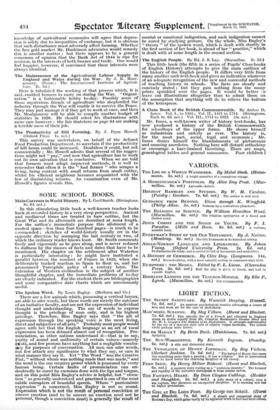The Spoken Word. By Louie Bagley. (Methuen and Co.) There
are a few animals which, possessing a vertical larynx, are able to utter words, but these words are merely the outcome of an imitative faculty, and are not the expression of individual thought and understanding. The use of words to express thought is the privilege of man only, and is his highest privilege. Therefore, Miss Bagley says that " the art of expression through the speaking voice is the most living, direct and subjective of all arts." Probably most people would agree with her that the English language as an art of vocal expression has been debased almost out of recognition. Pro- nunciation, as other nations understand it-that is to say, purity of sound and uniformity of certain values-scarcely exists, and few persons have anything but a negligible vocabu- lary for purposes of conversation. All men can utter words,' but few attach any significance to what they say, or care in what manner they say it. Yet " The Word " was the Creative Fiat, " without whom was nothing made that was made," and the word is the one creative power which is possessed by every human being. Certain faults of pronunciation can un- doubtedly be cured by exercises done with the lips and tongue, and on this point Miss Bagley's advice is helpful, but " elocu- tion " as generally understood and practised is one of the most subtle corrupters of beautiful speech. Where " pantomimic expression " is concerned, Miss Bagley is not so sound. Expression which is not the result of personal conviction or sincere emotion (and to be sincere an emotion need not be personal, though a conviction idust) is generally the-result of
mental or emotional indigestion, and such indigestion cannot be cured by studying gesture. On the whole, Miss Bagley's " theory " of the spoken word, which is dealt with shortly in the first section of her book, is ahead of her " practice," which is dealt with at some length in the second section.


































































 Previous page
Previous page